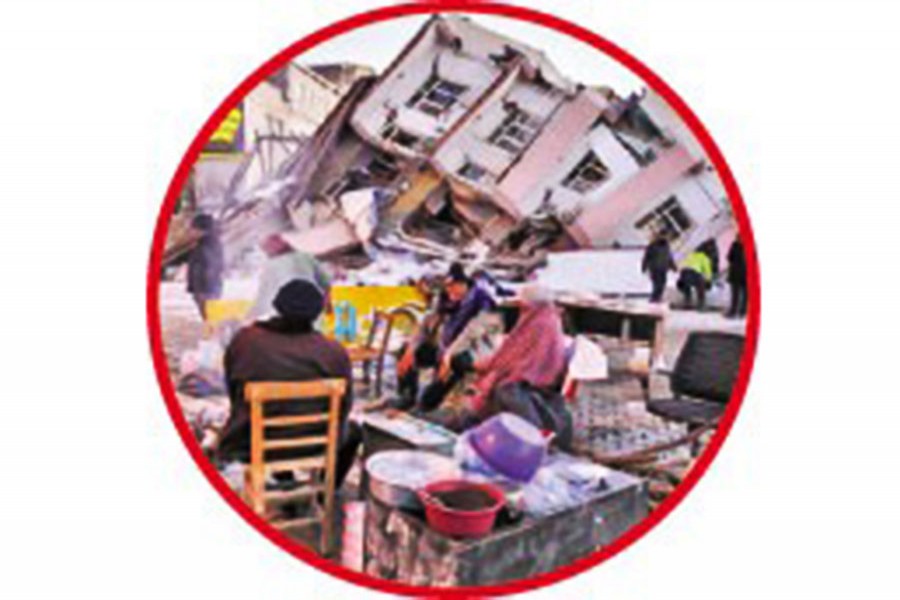The survival rate of the victims of earthquake of such gigantic magnitude (7.8 on the Moment Magnitude, or Mw, scale), as it happened on the Turkey-Syria border, falls very fast with each passing hour. Especially, the first 72-hour is a critical time window, because after that the survival rate falls to 10-5 per cent. But in the Turkey-Syria earthquake the 72-hour mark has passed more than a week ago. So, except some miracle rescues, actually, the bodies buried under the rubble of the collapsed buildings have meanwhile begun to rot. The air of the Kahranmaras city of Turkey is heavy with the smell of rotting bodies, says an Al Jazeera report. The death toll from the catastrophic Turkey-Syria earthquake crossed 28,000 (more than 24,600 of whom are Turkish and close to 3,600 Syrian) till Sunday morning, but the UN's Under-Secretary- General for Humanitarian Affairs and Emergency Relief Coordinator Martin Griffiths had earlier feared that the actual number of deaths might finally far exceed these figures.
As it happens during such disasters, clashes occur among the different groups over grabbing the relief materials. In such a situation in the Hatay province of South Turkey, the German and Austrian rescue teams have suspended search efforts. Also, incidents of looting the vehicles carrying relief goods have taken place. So, to continue the rescue and search operation smoothly, the Turkish administration of the area will be required to intervene to restore law and order. The good news is some troublemakers have meanwhile been arrested while the Turkish president has declared that he would use emergency powers to punish the lawbreakers. Even so, the members of the international search and rescue teams including those from Germany and others have expressed fears that the number of such violent clashes among different local factions may increase over the dwindling supply of the humanitarian aid. Rescue efforts apart, now, the focus should be more on providing food and shelter to the people made homeless by the earthquake. Medical care, especially for the traumatised and the injured people will be essential.
Given the overwhelming response of the world community to the Turkey-Syria earthquake victims, there should not be any dearth of relief and other supports. But the challenge would be to reach the rescue and relief efforts to areas devasted by the earthquake. Reports of difficulties, particularly, from the Syrian part of the affected areas have been coming. In fact, there are areas where the anti-government rebels are in control, while there are others where the Assad government has the say. Unfortunately, even during such humanitarian crisis of humongous scale, politics come in the way of distribution of the relief materials to the victims who need them most. And consider the consequence of any delay in reaching crucial aid including food, shelter and medicine to the victims. Many are still searching for their loved ones in the freezing temperatures outside.
For instance, the condition in Syria, as the BBC's chief correspondent in Turkey, Lyse Doucet, has described, is 'A crisis within a crisis within a crisis'. Even this earthquake, the kind of which in terms of its destructive power has not happened in the last two hundred years, could hardly compel the conflicting parties to see eye to eye with each other at least to save the quake victims. However, there is at least a streak of light at the end of the tunnel as the Syrian president Bashar al-Assad has given the green signal to deliver humanitarian aid everywhere in his country. And that he won't mind even if it (the humanitarian aid) goes to the rebel-held areas!
However, it is understood that it is the Syria's internal frontlines and not across the entire border areas with other countries that the humanitarian support would be allowed entry. But there are also other fears. For there is the risk of the emergency aid to save the quake victims' lives falling into wrong hands. In that case, relief goods would reach only the areas or segments of the population that are favoured by the government or the rebels. In that case, it would happen at the expense of those earthquake victims who have none to look after. This is the predicament of the international aid agencies. Worse still, there are certain aid agencies that openly support the government, of course, due to their political allegiance. Amid such uncertainties, the Syrian representative of the UN High Commissioner for Refugees (UNHCR) has told the media that some 5.3 million people may have become homeless in the quake-stricken areas in that county. The figure will be far higher in Turkey.
The Turkey-Syria earthquake should be a wakeup call for all nations, including Bangladesh, that are vulnerable to this still unpredictable kind of natural disaster. Since in the recent decades some very powerful earthquakes have hit some countries including Indonesia and Japan, there is reason for concern. The tsunami caused by the earthquake of 9.1 magnitude in December 2004, for example, killed 228,000 people in Indonesia. Amid the building collapses and attendant deaths, the Japanese one of 2011 destroyed parts of the Fukushima nuclear plant. The 2015's Nepal earthquake was also of 7.8 Mw magnitude that killed around 9,000 people. In the Southeastern Turkey, the buildings with faulty structure have been blamed for this devastation of an unforeseen scale. Bangladesh needs to learn from this in its preparedness against any earthquake in the future.


